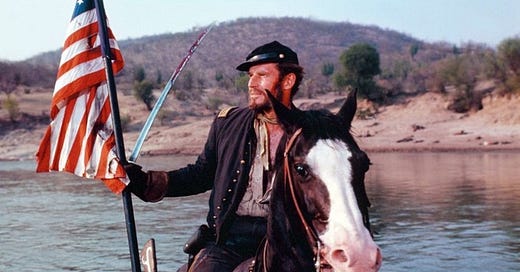Sam Peckinpah's Major Dundee - Moby-Dick On Horseback
The cavalry epic that stalled the filmmaker's Hollywood career.
It’s 1865 and renegade Apache Sierra Charriba (Michael Pate) and his band of warriors rule the roost over an area three times the size of Texas. A particularly vicious attack on a ranch house incurs the wrath of Union Major Amos Dundee (Charlton Heston), a decorated war hero who has been left guarding a prison full of captured Confederates after conducting the battle of Gettysburg on his own terms.
Such is Dundee’s determination to pursue the Apache, he supplements his meagre forces with a band of black volunteers (led by Brock Peters’ Private Aesop) and a contingent of POWs, the latter under the command of Captain Benjamin Tyreen (Richard Harris), an Irish nobleman who was good friends with Dundee at West Point until Amos testified against him at his court-martial.
A nighttime Apache ambush leaves Dundee’s men in disarray and they decide to rest up at a local village. After seeing off a band of French servicemen, the Major’s men settle down to some serious merrymaking while he romances Teresa (Senta Berger), an Austrian nurse. When the impromptu fiesta is over, the posse resume their quest only to be held up yet again when Dundee receives a leg wound. Matters are further complicated by the execution of one of the Confederates, OW Hadley (Warren Oates), for desertion.
Eventually, Dundee’s men get going again and they confront and kill Sierra Charriba and his tribesmen. With the Native Americans slain, Tyreen challenges Dundee to a duel. Before blows can be exchanged, a contingent of French lancers ride into view. In a epic riverside confrontation, Tyreen sacrifices himself to allow Dundee and his battered brigade to ride back to Texas.
The film that nearly ended Sam Peckinpah’s career, Major Dundee almost fell apart before it began. Although he was delighted to get a shot a big-budget filmmaking, Peckinpah hated the original Harry Julian Fink script and insisted on rewriting it. This didn’t please producer Jerry Bresler who, having got the project green lit, saw no reason to tamper with Fink’s screenplay.
The fights Peckinpah and Bresler had over the script were as nothing compared to what happened once the production moved to Mexico. Bresler, who didn’t understand why the film couldn’t be shot on Columbia’s back lot, was enraged by Sam’s on and off screen excesses and fired off endless memos to the studio, detailing the time and money Peckinpah was ‘wasting’.
Rather than sacking Sam mid-production, the Columbia chiefs waited until he had finished shooting the picture and then barred him from the editing. It was a tactic that incensed Peckinpah who launched a savage attack on the studio in the film press. His reward for this outburst was a place on the Hollywood blacklist. It would be four years before he directed another feature film.
Major Dundee’s a movie you’d love to like more than you actually can. Conceived by Peckinpah as ‘Moby-Dick on horseback’, a poorly-edited script and colossal studio interference turned it into a shaggy old mammoth of a movie - wooly in places, awe-inspiring in others. At its best (the relationship between Dundee and Tyreen, Hadley’s execution scene, the charge of the French lancers), it rivals anything in the Peckinpah canon. It’s just a shame that the picture got lumbered with a love story it doesn’t require and some lamentably improbable plotting.
A botched masterpiece then, but given the fashion for director’s cuts and re-releases, perhaps one day we may get to see the unexpurgated 154-minute cut that Richard Harris described as the greatest film he ever appeared in.




